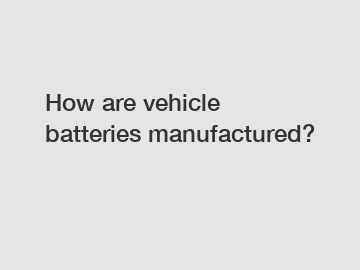How are vehicle batteries manufactured?
Have you ever stopped to think about how the batteries in your vehicle are manufactured? It's a fascinating process that involves cutting-edge technology and precision engineering. In this blog post, we will take a deep dive into the world of vehicle battery manufacturing to uncover the secrets behind these essential components.
The first step in the manufacturing process is to gather the raw materials needed to create the battery. This includes lead, which is the primary component of most vehicle batteries. The lead is combined with other metals, such as tin and antimony, to create a lead alloy that will form the plates inside the battery.
Once the lead alloy is created, it is cast into grids that will serve as the foundation for the battery plates. These grids are then coated with a paste made from lead oxide and sulfuric acid, which will react with the lead in the grids to form the positive and negative plates of the battery.

Next, the plates are stacked together inside a battery case and separated by insulating materials to prevent short circuits. The case is then filled with an electrolyte solution made from sulfuric acid and water, which allows the flow of electric current between the positive and negative plates.
The final step in the manufacturing process is to seal the battery case and test the finished product to ensure it meets the necessary quality standards. This includes checking the voltage output, capacity, and overall performance of the battery to ensure it will provide reliable power to your vehicle.
But the manufacturing process doesn't stop there. Once the batteries are produced, they must be shipped to distribution centers and eventually to auto manufacturers who will install them in vehicles. This requires careful coordination and logistics to ensure that the batteries arrive on time and in perfect condition.
Vehicle battery manufacturing is a highly specialized and complex process that requires a significant amount of expertise and precision. Manufacturers must adhere to strict quality control standards to ensure that each battery meets the necessary safety and performance requirements.
In addition to the technical aspects of battery manufacturing, there are also environmental considerations to take into account. Lead-acid batteries, in particular, can have a significant impact on the environment if they are not properly recycled. Manufacturers must implement sustainable practices to ensure that old batteries are disposed of responsibly and that materials are reused whenever possible.
Overall, vehicle battery manufacturing is a fascinating process that combines cutting-edge technology with precision engineering. From the creation of the lead alloy grids to the final testing of the finished product, every step in the process requires a high level of attention to detail and expertise.
So the next time you turn the key in your vehicle and hear the engine roar to life, take a moment to appreciate the incredible technology that powers your car. Without the batteries that provide the necessary energy, your vehicle would be nothing more than a hunk of metal sitting in your driveway.
In conclusion, vehicle battery manufacturing is a crucial and intricate process that requires a high degree of expertise and precision. From the creation of the lead alloy grids to the final testing of the finished product, every step in the process is carefully managed to ensure that the batteries meet the necessary quality standards. So the next time you hit the road, remember the incredible technology that powers your vehicle and the skilled professionals who make it all possible.
If you are looking for more details, kindly visit China battery module assembly line, pouch lithium battery production line, CE certified prismatic cell assembly.


